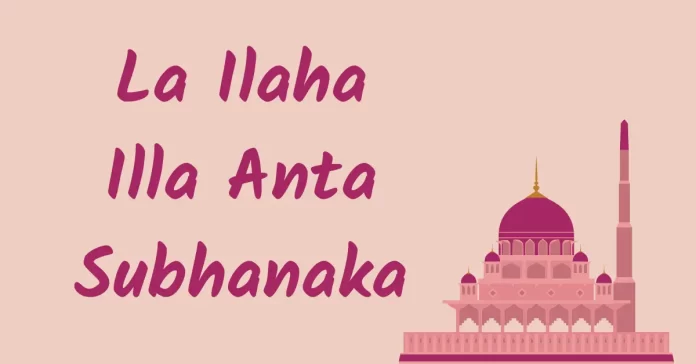Introduction to La Ilaha Illa Anta Subhanaka
In the cacophony of life’s challenges, sometimes we find ourselves reaching out for a lifeline, something to anchor our souls amidst the storm. In these moments, the profound simplicity of “La ilaha illa anta Subhanaka” (There is no god but You, Glory be to You) becomes not just a phrase, but a beacon of hope, a prayer that transcends language barriers and resonates deeply within the human spirit.
Understanding the Phrase
The Arabic phrase “La ilaha illa anta Subhanaka” holds layers of meaning that unfold like petals of a flower. At its core, it professes the Oneness of Allah (SWT), declaring that there is no deity worthy of worship except Him. This declaration, known as the Shahada, is the cornerstone of Islamic faith, affirming belief in the absolute sovereignty and supremacy of Allah.
But “Subhanaka” adds a depth of reverence and awe to this declaration. It translates to “Glory be to You,” acknowledging Allah’s perfection, purity, and transcendence beyond human comprehension. In uttering these words, one acknowledges not only the existence of a higher power but also His majestic attributes that inspire humility and reverence.
The Power of Invocation
In times of distress or despair, turning to this simple yet profound invocation can be immensely comforting. The Prophet Muhammad (peace be upon him) emphasized the efficacy of supplicating with sincerity, especially in moments of vulnerability. Abu Huraira (may Allah be pleased with him) narrated that the Prophet said: “There is no one who utters these words sincerely seeking Allah’s pleasure except that the doors of the heavens are opened for these words until they reach the Throne of Allah, so He says, ‘O bearer of these words, what do you wish for?'” (Tirmidhi)
This Hadith illustrates the divine responsiveness to sincere invocation, highlighting the significance of “La ilaha illa anta Subhanaka” as a supplication that ascends to the heavens and reaches the Throne of Allah.
Reflecting on the Quran
The Quran, the ultimate source of guidance for Muslims, is replete with verses that echo the essence of “La ilaha illa anta Subhanaka.” In Surah Al-Anbiya (21:87), Prophet Yunus (Jonah) found himself in the belly of the whale, engulfed in darkness and despair. In his moment of utter helplessness, he called upon Allah with this heartfelt invocation:
“And [mention] the man of the fish, when he went off in anger and thought that We would not decree [anything] upon him. And he called out within the darknesses, ‘There is no deity except You; exalted are You. Indeed, I have been of the wrongdoers.'”
Yunus’ plea encapsulates the essence of absolute dependence on Allah and acknowledgment of His transcendence over all creation. It serves as a timeless reminder that even in the depths of despair, the light of faith can illuminate the darkest of circumstances.
Finding Tranquility in Submission
Submission to the will of Allah is the cornerstone of Islamic faith, and “La ilaha illa anta Subhanaka” encapsulates this spirit of surrender. When faced with trials and tribulations, reciting this invocation serves as a profound act of submission, entrusting one’s affairs to the One who is All-Knowing and All-Powerful.
The story of Prophet Musa (Moses) provides a poignant example of this surrender. When fleeing from Pharaoh’s tyranny, with the sea blocking his escape and the enemy closing in, Musa turned to Allah in supplication:
“[Moses] said, ‘No! Indeed, with me is my Lord; He will guide me.’ Then We inspired to Moses, ‘Strike with your staff the sea,’ and it parted, and each portion was like a great towering mountain.” (Surah Ash-Shu’ara, 26:62-63)
In moments of desperation, Musa’s unwavering trust in Allah’s guidance and power led to the miraculous parting of the sea, showcasing the transformative power of faith and submission.
The Universality of Spiritual Connection
While “La ilaha illa anta Subhanaka” holds profound significance within the Islamic tradition, its essence transcends religious boundaries. The recognition of a higher power and the humility expressed in glorifying His attributes are universal themes that resonate with seekers of truth across cultures and faiths.
In the Hindu tradition, the concept of “Neti, Neti” (“Not this, Not this”) reflects a similar sentiment of negating all worldly limitations to arrive at the realization of the divine. Likewise, the Christian Lord’s Prayer emphasizes surrendering to the will of God with the words, “Thy will be done.”
Conclusion: Embracing Divine Remembrance
In the hustle and bustle of modern life, it’s easy to lose sight of the spiritual dimensions of our existence. Yet, in moments of stillness and introspection, the timeless wisdom of “La ilaha illa anta Subhanaka” beckons us to reconnect with our souls and transcend the ephemeral concerns of the material world.
As we navigate the complexities of life’s journey, may we find solace in the simple yet profound declaration of faith, knowing that in the remembrance of Allah lies the ultimate tranquility of the heart.
Let us echo the words of Prophet Yunus, acknowledging our inherent human frailty and the boundless mercy of our Creator:
“There is no deity except You; exalted are You. Indeed, I have been of the wrongdoers.”
In this divine remembrance, may we find peace, guidance, and ultimately, the fulfillment of our souls’ deepest yearnings.
References:
- Sahih al-Bukhari
- Sahih Muslim
- Jami` at-Tirmidhi
- The Holy Quran, Surah Al-Anbiya (21:87)
- The Holy Quran, Surah Ash-Shu’ara (26:62-63)
Frequently Asked Questions (FAQs)
What does “La ilaha illa anta Subhanaka” mean?
“La ilaha illa anta Subhanaka” is an Arabic phrase that translates to “There is no god but You, Glory be to You.” It is a declaration of the Oneness of Allah (SWT) and an acknowledgment of His perfection and transcendence.
Where does this phrase come from?
This phrase is derived from Islamic teachings and is prominently mentioned in the Quran, particularly in the story of Prophet Yunus (Jonah), as well as in various Hadiths (sayings of the Prophet Muhammad, peace be upon him).
What is the significance of reciting “La ilaha illa anta Subhanaka”?
Reciting this phrase is considered a powerful form of supplication and remembrance of Allah. It serves as a reminder of His absolute sovereignty and the need for humility and submission in front of His majesty.
How does this phrase help in times of distress?
In moments of difficulty or despair, turning to this invocation can provide solace and comfort. It reaffirms one’s faith in Allah’s mercy and omnipotence, serving as a means of seeking His help and guidance.
Is there a specific way to recite this phrase?
There is no prescribed method for reciting “La ilaha illa anta Subhanaka.” It can be recited silently or aloud, in any situation where one seeks to invoke the remembrance of Allah and express gratitude for His blessings.
Can people of other faiths use this phrase?
While this phrase is deeply rooted in Islamic tradition, its essence of acknowledging a higher power and expressing reverence transcends religious boundaries. People of any faith or belief system can reflect on its universal message of humility and spiritual connection.
Are there any specific times or occasions when this phrase is recommended to recite?
This phrase can be recited at any time, but it holds particular significance during moments of reflection, prayer, or seeking divine assistance. Some Muslims recite it during their daily prayers or as part of their supplications during times of distress.
Does reciting “La ilaha illa anta Subhanaka” have any special benefits?
According to Islamic teachings, sincere recitation of this phrase is believed to be met with divine acceptance and mercy. The Prophet Muhammad (peace be upon him) emphasized the efficacy of supplicating with sincerity, especially in moments of vulnerability.
Are there any similar phrases in other religious traditions?
Yes, various religious traditions have similar expressions of monotheism, humility, and reverence for the divine. For example, in Christianity, the Lord’s Prayer emphasizes surrendering to the will of God, while in Hinduism, the concept of “Neti, Neti” reflects negation of worldly limitations to realize the divine.
Can “La ilaha illa anta Subhanaka” be recited in any language?
While the original phrase is in Arabic, its essence can be conveyed in any language. The important aspect is the sincerity and understanding behind the recitation, rather than the language itself.

